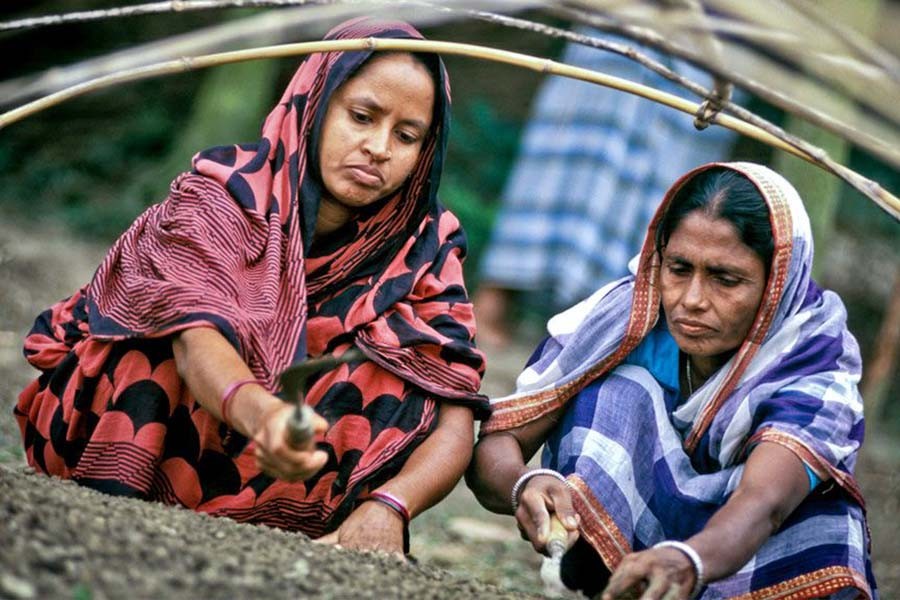Bangladesh was born through a war of liberation based on the principles of democracy, social justice, self reliance and economic emancipation, once called "the last noble cause" by Andre Malraux. Acclaimed as an independent and sovereign state in 1971, the densely populated country at the head of the Bay of Bengal has swung between hopes and despairs, between mass apathy and violence in the streets. It is yet to be seen whether economic growth-oriented development models, which create both gross and net happiness for the national elites, have brought genuine and lasting happiness for the broad majority. However, building a self-reliant development model for Bangladesh appears to be justified, as its population maintains the spirit of resilience in political, economic and social spheres. Self-reliant development should be measured on the basis of social proficiency and happiness, not merely economic efficiency and productivity.
Bangladesh was a prosperous region of South Asia until modern times. It had the advantages of a mild, almost tropical climate, fertile soil, ample water, and an abundance of fish, wildlife, and fruit, facilitating a comfortable standard of living compared to other parts of South Asia. But independent Bangladesh, from the very beginning, has been regarded as a test case for development by economists, policymakers, donor countries and international financial institutions.
In 1971, Bangladesh had 75 million people and per capita annual income was only US$100. In four decades, its population has increased to around 160 million and per capita income to $1644. It was a self-reliant country in the past in the sense that it depended entirely on the efforts of its own people. But the introduction of Green revolution in the 1960s caused a sharp change in its self-reliance posture. It introduced dependence on external aid, which is a well-known phenomenon that slows down the journey towards sustainability.
A country that frames development plans by depending mostly on the receipt of substantial foreign aid do much damage to the spirit of self-respect and self-reliance of its people. Even in the narrowest economic or academic sense, the loss is greater than the gain. Resources, particularly money, are not value-free. They bring certain baggage with them, depending on their origin and culture. They may not be available in the future, and they have significant disadvantages that outweigh their advantages. Carmen (1996) also noted that development aid was tied to the power of money, and the power of money was identified with the right kind of interventions. Such interventions generally impacted negatively on traditional systems within society, causing a breakdown of its integrity.
Bangladesh's dependence on foreign aid can be traced to the compulsions of a war-ravaged economy in 1971. But what initially began as a necessity for the rehabilitation of 10 million refugees displaced by the nine-month-long independence war, soon became a pattern of dependent development. It became a convenient and easy option, in place of taking hard decisions on mobilising domestic resources and improving the yield of investments.
It has received various aids, grants and loans in the form of food, commodity and project aid. An empirical study (Rehman Sobhan, Iftekharuzzaman and Rumana S. Khan ) revealed some crude facts, some of which were as follows: (a) A new elite class emerged in Bangladesh whose affluence derived from such aid programmes, so much so that the percentage of businessmen and industrialists among the legislators increased from 4.0 per cent in 1954, to 24 per cent in 1973, 59 per cent in 1991-92, and around 70 per cent in 2008-09; (b) Bangladesh's human rights record, defence expenditure and other internal matters, all remained under the observation of donor countries; (c) privatisation and disinvestments of public sector enterprises grew fastidiously, but at the cost of lack of sustained industrial growth; (d) it is estimated that a significant percentage of aid went to the donors in the form of costs of procurement of project inputs and consultancy fees to foreign experts; (e) it inevitably led to a heavy debt burden that future generations of Bangladeshis would have to pay one day or the other; (f) aid dependence eroded the sovereign power of any country in the economic realm; (g) the massive amount of borrowed aid imposed serious financial burden on future generations and the high loan burden substantially curtailed the development spending; (h) heavy dependence on external resources for public expenditure has had its impact on the domestic economy; domestic savings as a percentage of GDP fell and this declining rate of saving was in turn reflected in the low rate of gross investments.
The concept of living in a state of self-reliant sustainability and economic emancipation involves a naturally simple lifestyle with enough resources for catering to basic needs. It does not encourage ill health, famine, illiteracy or inadequate living standards. Self-reliant living is a viable means of caring for both Nature and human beings, and hence, for sustainability.
Grassroots people should be encouraged to realize that they are the key agents for a better future; that the best route to sustainable development takes place when it is owned and managed by the people themselves; that their work will be stronger and much more successful through unity, solidarity and self-help initiatives. The National Board of Revenue (NBR) may undertake initiatives to generate more tax money from potential taxpayers to help the government move out of credit trap. They can urge people to help the government in building a self-reliant Bangladesh through paying income tax spontaneously. They can initiate steps for creation of a client-friendly tax administration, and try to narrow the gap between tax-payer and collector by changing their mindsets. All these should be directed towards transforming the economy at large from credit dependence to self-reliance, in order to ensure economic emancipation of the masses.
Dr Muhammad Abdul Mazid is a former Secretary to the government and Chairman, NBR.


